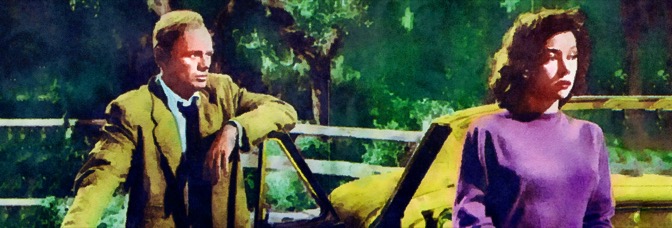A more appropriate title might be The Trouble with the Drapes, but even with the misleading moniker, The Cobweb is a good Cinemascope drama. Cinemascope dramas went out some time in the mid-1960s. Vincente Minnelli is great at them. In The Cobweb, he turns a little story (I can’t believe it’s from a novel–it must have had a lot more on the characters, since the present action is incredibly limited) into a big movie. Richard Widmark doesn’t hurt. Even as a caring psychiatrist, Widmark amplifies the film. Nothing he does–except for one scene, his performance is understated–but something about his presence. His and Lauren Bacall’s. They signal big Cinemascope drama. So does Leonard Rosenman’s score. Rosenman brings the music up for all the characters’ emotions and, since some of the characters do a lot solo, there’s quite a bit of the music. Only once does it get a little too much, when Gloria Grahame (as Widmark’s wife; Bacall’s the nurse he likes too much) is freaking out. Oddly, the dialogue plays against the omnipresent music. The Cobweb has very delicate–and very good–dialogue. It’s one of the reasons the film succeeds: good dialogue performed by good actors makes even the most banal story involving. Of course, it doesn’t hurt The Cobweb pulls itself out from its third act spiral.
There’s not much going on in the film–it really is all about the fallout of buying new drapes for a psychiatric clinic–and it’s the characters keeping it moving. At the end, there needs to be a resolution and so–I assume it’s from the book, but it’s funny enough it might be a filmic innovation–things get resolved. Cinemascope dramas always resolve nicely at the end, part of the genre requirements. But The Cobweb‘s resolution is too easy. It’s too abbreviated. But at the last moment, in a very nicely timed scene, it pulls off a great close.
John Houseman produced the film, which might account for Mercury Theatre member Paul Stewart’s too small role, and maybe Houseman’s involvement accounts for some of the gentleness in the picture. The scenes with Widmark and his son playing chess or talking are some of the film’s most effective, because they’re–for the majority of the running time–the only real insight we get in to Widmark’s feelings. The rest of the time, until he and Bacall get inappropriate, he’s too busy worrying about his patients. Grahame’s really good in a difficult, unlikable role, and managing to keep the character sympathetic by the end of the film is a real achievement on Grahame’s part. Bacall’s good tog, but her character gets reduced into an “other woman” role (but she has a great exit). Other exceptional performances (they’re all good) are Charles Boyer and Lillian Gish. Boyer has a slightly more difficult role, but Gish is more impressive, maybe just because I’m unfamiliar with her work.
There’s a little bit too much going on in The Cobweb. There’s easily material for three films in here–Widmark and Grahame, Bacall’s character needs a whole picture, and John Kerr and Susan Strasberg’s mental patient romance deserves one too (Kerr’s real impressive and it’s he and Grahame who get the film off to its good start). It’s an imperfect Cinemascope drama, though a great example of one, but still a satisfying experience.

Leave a Reply